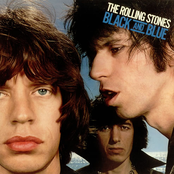Black And Blue

Biography
Black and Blue is an album by The Rolling Stones, released in 1976. It was the band's first studio album released with Ronnie Wood as the replacement for Mick Taylor. Wood had played 12-string acoustic guitar on the track "It's Only Rock 'n Roll (But I Like It)" of the 1974 Rolling Stones album It's Only Rock 'n' Roll and appears on half of the Black and Blue album tracks (mostly backing vocals) with Wayne Perkins and Harvey Mandel playing guitar on the remaining titles. History In Decembe...
Black and Blue is an album by The Rolling Stones, released in 1976. It was the band's first studio album released with Ronnie Wood as the replacement for Mick Taylor. Wood had played 12-string acoustic guitar on the track "It's Only Rock 'n Roll (But I Like It)" of the 1974 Rolling Stones album It's Only Rock 'n' Roll and appears on half of the Black and Blue album tracks (mostly backing vocals) with Wayne Perkins and Harvey Mandel playing guitar on the remaining titles. History In December 1974 The Rolling Stones returned to Munich, Germany—the recording site of their previously release It's Only Rock 'n' Roll—and began the recording of their new album at Musicland Studios, with Mick Jagger and Keith Richards (as The Glimmer Twins) producing again. With a view to releasing it in time for the summer 1975 Tour of the Americas, the band broke for the holidays and returned in January in Rotterdam, Netherlands to continue working—all the while auditioning new guitarists as they recorded. Among the hopefuls were Jeff Beck, Rory Gallagher, Harvey Mandel, Wayne Perkins, Peter Frampton and Ronnie Wood (although only Mandel's, Perkins' and Wood's guitar work would appear on the finished album). With much work to follow, it was decided to delay the album for the following year and release the Made in the Shade compilation instead. "Cherry Oh Baby" (which was a cover version of an early reggae song) would be the only song from the upcoming album sporadically played on the Americas tour. Following the conclusion of the tour, The Rolling Stones went to Montreux, Switzerland in October for some overdub work, returning to Musicland Studios in Munich in December to perform similar work. After some final touch-ups, Black and Blue was completed in New York City in February 1976. Stylistically, Black and Blue embraces funk with "Hot Stuff"; reggae with their cover of "Cherry Oh Baby"; and jazz with "Melody", featuring the talents of Billy Preston - a heavy contributor to the album. Musical and thematic styles were merged on the seven-minute "Memory Motel", with both Jagger and Richards contributing lead vocals to a love song embedded within a life-on-the-road tale. Released in April 1976—with "Fool to Cry", a worldwide Top 10 hit, as its lead single—Black and Blue reached #2 in the UK and spent an interrupted four week spell at #1 in the US, going platinum there. Critical view was polarized: Lester Bangs wrote in Creem that "the heat's off, because it's all over, they really don't matter anymore or stand for anything" and "This is the first meaningless Rolling Stones album, and thank God"but in the 1976 Creem Consumer Guide Robert Christgau rated the album an A-. Bill Wyman released a version of "Melody" with his Rhythm Kings, and claimed the song was written by Preston. The album was promoted with a controversial billboard on Sunset Boulevard in Hollywood that depicted the model Anita Russell, bruised and bound by Mick Jagger under the phrase "I'm Black and Blue from the Rolling Stones — and I love it!" The billboard was removed after protests by the feminist group Women Against Violence Against Women, although it earned the band widespread press coverage. Two extra tracks recorded in the Rotterdam sessions were later released on 1981's Tattoo You—"Slave" and "Worried About You". In 1994, Black and Blue was remastered and reissued by Virgin Records, and again in 2009 by Universal Music. Track listing All songs by Jagger/Richards except where noted. Side one "Hot Stuff" – 5:20 "Hand of Fate" – 4:28 "Cherry Oh Baby" (Eric Donaldson) – 3:53 "Memory Motel" – 7:07 Side two "Hey Negrita" (Inspiration by Ronnie Wood) – 4:58 "Melody" (Inspiration by Billy Preston) – 5:47 "Fool to Cry" – 5:04 "Crazy Mama" – 4:34 Personnel The Rolling Stones Mick Jagger – Lead vocalist, backing vocals, percussion, rhythm guitar on "Crazy Mama", and electric and acoustic piano on "Memory Motel" and "Fool to Cry" Keith Richards – guitar, backing and lead vocals, Fender Rhodes electric piano on "Memory Motel", and bass guitar on "Crazy Mama" Charlie Watts – drums and percussion Ronnie Wood – guitar on "Cherry Oh Baby" and "Crazy Mama", lead guitar on "Hey Negrita", and backing vocals on "Hot Stuff", "Hand of Fate", "Memory Motel", "Hey Negrita", and "Crazy Mama" Bill Wyman – bass guitar and percussion Additional personnel Billy Preston – backing vocals; harmony vocal on "Melody"; piano on on "Hot Stuff", "Hand of Fate", "Hey Negrita", "Melody", and "Crazy Mama"; organ on "Hey Negrita" and "Melody"; keyboards; string synthesizer on "Memory Motel" Nicky Hopkins – piano, organ on "Cherry Oh Baby", ARP String Ensemble on "Fool to Cry" Harvey Mandel – electric guitar on "Hot Stuff" and "Memory Motel" Wayne Perkins – acoustic and electric guitar on "Hand of Fate", "Memory Motel", and "Fool to Cry" Ian Stewart – percussion Ollie Brown – percussion Arif Mardin – horn arrangement on "Melody" Chart positions Album Year Chart Position 1976 UK Top 60 Albums 2 1976 Billboard 200 1 Singles Year Single Chart Position 1976 "Fool to Cry" UK Top 50 Singles 6 1976 "Fool to Cry" The Billboard Hot 100 10 1976 "Hot Stuff" The Billboard Hot 100 49 1976 "Hot Stuff" Black Singles 84 1976 "Hot Stuff" Club Play Singles 11 Read more on Last.fm. User-contributed text is available under the Creative Commons By-SA License; additional terms may apply.



